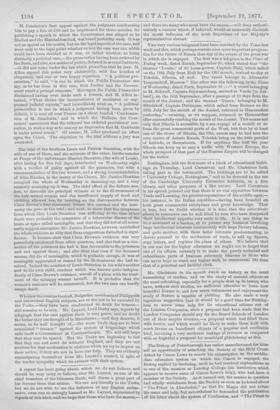It Gambetta's first appeal against the judgment condemning him to
pay a fine of £,80 and be imprisoned for three months, for publishing a speech in which the Government was alleged to be libelled and the Marshal insulted, was heard yesterday week. It was not an appeal on the merits, but on the legal aspects of the case, and went only to the legal point whether or not the case was one which could have been decided as it was, or rather whether, as being distinctly a political case,—the prosecution having been ordered by the State, and also, as a matter of policy, debated in several Cabinets, —it did not come under the law which prescribes trial by jury. M. Allou argued this point very elaborately, with fine touches of eloquence, and one or two happy repartees. "A political pro- secution," he said, "is one in which the Public Prosecutor can say, as he has done in this case, that Justice and the Govern- ment await a prompt response." Hereupon the Public Prosecutor disclaimed having ever made such a remark, and M. Allou re- torted, "That shows the inconvenience of mutilated or sup- pressed judicial reports," and immediately went on, "A political prosecution is one in which a judgment having been given by default, it is sent all over France on a sheet beaded 'Condemna- tion of M. Gambetta,' and in which the 'Bulletin des Com- munes' announces that the tribunal has ordered provisional exe- cution, in such a way as to convey an impression that M. Gambetta is under actual arrest." Of course, M. Allou produced no effect upon the Court. The objection to the trial without a jury was overruled.


































 Previous page
Previous page